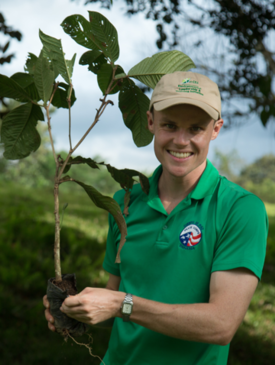Ecological Restoration Strategies in Agricultural Landscapes of Panama
Summary
The Republic of Panama is known for providing a critical link in global trade via the Panama Canal and for its impressive economic growth in the past decade. Despite this progress, Panama still suffers from stark regional disparities. Extreme poverty is still high. Around 27% of the rural population is considered extremely poor; in indigenous territories, this number is as high as 40% (World Bank 2017). Economic opportunities in rural areas are sparse, so landowners often rely on conventional agriculture and cattle ranching practices that involve the cutting and burning of forests to plant annual crops and pasture grasses. When practiced on marginal steeply sloped land, soils quickly erode and lose fertility, leading to low agricultural production, decreased ecosystem integrity and few social benefits. FAO (2014) estimates that 27% of Panama’s agricultural lands are highly degraded, which severely impairs the ability of these areas to generate the range of ecosystem services necessary to support sustainable production systems, including soil fertility, provision of water, carbon sequestration and biodiversity.
Given this context, rural landholders can benefit from capacity building and access to information about more sustainable land use practices, especially while attempting to adapt to climate change. Invited by the Panamanian Government, the United States Peace Corps helps to address this need by sending professionals to “work at the grassroots level toward sustainable change that lives on long after their service” (USPC 2017). Volunteers are assigned for a two-year period to rural communities that request Peace Corps Volunteer (PVC) assistance and work in collaboration with Panamanian partners. The cultural exchange and development assistance that PCVs provide is critically important for empowering rural people to make informed and sustainable decisions.
To strengthen the technical background of PCVs in their role as environmental conservation extension agents, ELTI offers a “training of trainers” course, as part of the Peace Corps Panama’s “In-Service Training,” a two-week technical training offered to PCVs mid-service. This course provides PCVs with the basic knowledge, skills and abilities necessary to conduct forest restoration strategies with their community counterparts and partners.
Content
The material is divided into three thematic modules, which include an introductory lecture with corresponding observations and exercises in the field.
Module 1: Tropical forest ecology and ecosystem services
- Introduction to tropical forests ecosystems of Panama and key tree and plant species
- Introduction to the provision of ecosystem goods and services
- Introduction to tropical forest dynamics
Module 2: Deforestation and forest degradation
- Introduction to regional drivers of tropical forest deforestation and degradation
- Ecological and social consequences of degradation and barriers to restoration
Module 3: Strategies for the restoration of ecosystem services in human-modified landscapes
- Introduction to the forest restoration conceptual framework
- Approaches to tailor restoration strategies for socio-economic and cultural contexts
- Best practices to establish small-scale nurseries and propagate native tree species


